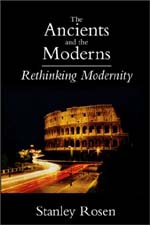 (Reprinted with permission from Classical World, written by Meyer Reinhold.)
(Reprinted with permission from Classical World, written by Meyer Reinhold.)
Hard upon the heels of Stanley Rosen’s illuminating book The Quarrel between Philosophy and Poetry: Studies in Ancient Thought comes this remarkable groundbreaking look at the Battle of the Books, or “La Querelle des anciens et des modernes,” that has been waged in fervent or moderate forms since the Renaissance. Rosen’s insightful, closely reasoned study is an important contribution to the ongoing debate on the classics in the core curriculum fomented by the conservatives’ “back to the basics” of Western civilization, championed recently by the missionary zeal of William Bennett and Allan Bloom’s The Closing of the American Mind.
Rosen here speaks directly to the philosophers (he assumes technical familiarity with Plato, Socrates, Aristotle, Descartes, Fichte, Hegel, Heidegger, Rorty, Kant, and Nietzsche), but he also addresses all of us who are struggling with the curriculum. One of his dominant theses is that “the quarrel between the ancients and the moderns is especially evident with respect to the pivotal concept of (individual) freedom.” In the face of the waning of contemporary self-confidence, Rosen argues, the partisans of antiquity, fearful of scientific technology and the immense pluralism of the modern world, press upon us the paradigm of classical virtue, so fervently supported by partisans in the American and French revolutions. This posits the primacy of communitarian values in republics, as in the works of Plato, Aristotle, and Cicero, and as idealized in the ancient commonwealths of Sparta and of Rome at the acme of its republic. Rosen methodically refutes the facile assertion that the quarrel between antiquity and modernity reflects an opposition between classical nobility and modern sophistry. He demonstrates that in the discourse about “La Querelle,” there were ancients and moderns in both the modern and ancient worlds. Not only do we project ourselves into antiquity, but “moderns ... are also ancients,” and there were also moderns among the ancients.
In faulting the champions of antiquity over modernity, Rosen demands fundamental understanding of the modalities of antiquity to overcome idealization and ideology, and concludes: “We cannot apply the classical doctrine of virtue as a standard for improving modern moral and political life except by transforming that life beyond recognition.” The Battle of the Books has been put on a new foundation.
Appetizer
Whereas no one would argue against the wisdom of attempting to prevent a nuclear holocaust or the biochemical pollution of the environment, not many are prepared to admit that the only secure way in which to protect ourselves against science is to abolish it entirely. I pass by the practical obstacles, as we are here engaged in the discussion of principles and paradigms. Science must not merely be abolished, then, but our security requires that it never be permitted to arise in the future. The machines must be broken and the textbooks burned, but beyond this we require noble lies and philosopher guardians who will weed out and destroy the potential scientists from each generation of children.
—The Ancients and the Moderns: Rethinking Modernity